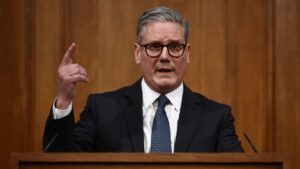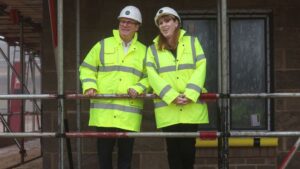What if Rishi Sunak had waited until now to call an election?
Rishi Sunak surprised many people – including in his party – when he said the general election would take place in July. Many thought he would wait until around now to go to the polls, waiting for a better economy and the US election. So what might have happened?

It’s the biggest “What if?” in politics this year.
What if Rishi Sunak had done what most MPs expected him to do earlier in the year and held the general election this week, on Thursday 14 November?
Mr Sunak said his “working assumption” was the election would be in the second half of this year. And, to be fair, he was true to his word – just – with a 4 July poll.
Politics latest: PM has ‘no plans’ to meet Taliban at climate summit
But from the day he made his shock announcement on 22 May, to this day – and after the near wipe-out of Conservative MPs – many Tories still believe his snap election was a catastrophic mistake.
The Conservatives were left with just 121 MPs, their lowest ever total. Labour won 411 and the Liberal Democrats 72 – and Sir Keir Starmer’s Commons majority was a massive 174 seats.
Nigel Farage’s Reform UK, with just five seats but more than four million votes, inflicted enormous damage on the Tories. Some Conservative MPs with 20,000+ majorities were blown away in the landslide.
In Westminster, 14 November was pretty much nailed on as the election date for months. “November 14 kind of writes itself,” former chancellor George Osborne declared back in January.
Britain’s foremost elections guru and politics professor Sir John Curtice agreed. “There is beginning to be a consensus it might be 14 November,” he said a week before Mr Osborne’s prediction.
“The prime minister will end the Conservative conference on 2 October. That might be the starting gun.”
Read more on 2024 election:
Sunak calls vote for 4 July in pouring rain
Reform wins five seats – Farage heckled
What’s going on behind the scenes after Tory party’s defeat
But as it turned out, the only starting gun fired at the Tory conference was for the final heats in the Tory leadership race ahead of the run-off between Kemi Badenoch and Robert Jenrick.
In March, Michael Gove, then a senior cabinet minister, said: “I think 14 November or 21st.” But then he claimed: “I have no inside knowledge at all.” Obviously not.
So would the Conservatives have done better – or worse – if Mr Sunak had opted for the date most of his MPs expected and were planning for? Or would it have made little or no difference?
In his Daily Mirror column, Sky News paper reviewer Kevin Maguire wrote: “Sunak jumping early ranks alongside Jim Callaghan in 1978 and Gordon Brown dithering in 2007, plus Theresa May’s 2017 snap election, as four moments when PMs called it catastrophically wrong.”
The 2024 campaign not only caught the nation on the hop but caught Westminster by surprise too, not least Mr Sunak’s own party. The Tories hadn’t even selected candidates in many key seats and were woefully unprepared.
So what would have been different if Mr Sunak had waited until November? Last week’s US election proved the truth of the Bill Clinton slogan “The economy, stupid”, handing victory to Donald Trump.

Keep up with all the latest news from the UK and around the world by following Sky News
Since July, the Labour government has benefitted from good news on the economy.
Inflation has fallen to 1.7% and interest rates were cut last week, which means cheaper mortgages.
Tory MPs believed tax cuts would have given their party a boost ahead of a November election. But during the election campaign the chancellor Jeremy Hunt claimed tax cuts and lower interest rates wouldn’t do the Conservatives much good.
“The fact that we’ve had two significant tax cuts that haven’t really changed the polls demonstrates to me that having a third one with the same again is unlikely to change the calculus,” he said in a pessimistic interview in the Mail on Sunday in June.
“The Bank of England’s view is that there’s an 18-month delay between changing interest rates and it impacting on people’s finances. So the idea that you have a drop in interest rates and suddenly everyone feels good is to underestimate how people are making this decision.”
But while the news on the economy has been good for Labour, the news on illegal migrants crossing the channel has been all bad.
This week it was revealed the number of arrivals has reached 32,691, up 22% on last year.
Many Tory MPs believe delaying until November would have enabled the controversial Rwanda deportation policy to cut the numbers, though plenty in Mr Sunak’s government had their doubts whether it would work. Was that a factor in opting for a July poll?
There’s no doubt, however, that some dreadful blunders would have been avoided by delaying until November. The most disastrous of these was Mr Sunak leaving the D-Day anniversary early to record a TV election interview.
Would the summer riots after the Southport stabbings have happened had there been a Conservative government? Probably. Would Mr Farage still have made his spectacular and ultimately successful comeback or spent more time in the US as a Trump cheerleader? Surely the lure of a comeback would have been irresistible.
History might have been kinder to Mr Sunak, though, if he’d completed two years as PM rather than a year and 255 days. Even after a November defeat he would have overtaken Sir Antony Eden in the prime ministerial league table.
By going early, Mr Sunak also handed Sir Keir the gift of an early debut as an international statesman on the world stage, including a NATO summit in Washington in his first week as PM.
Be the first to get Breaking News
Install the Sky News app for free


The Tory leadership race would have come much later and some potential candidates may not have lost their seats. Penny Mordaunt, for example, lost to Labour by just 780 votes in Portsmouth North.
So why didn’t Mr Sunak delay? A senior Conservative MP who stood down but still believes the 4 July election was a horrendous blunder is convinced the reason was the threat to his authority from his rebellious MPs.
“For a start, I’d still be being paid!” the ex-MP told Sky News. “It was entirely down to party management, his mutinous MPs and his worries about getting his legislation through. Now, though, with just 121 MPs, it’s very difficult to oppose.
“In 1997 we had 165 MPs. If we’d gone in November we might have won 145 or 150 MPs, which wouldn’t have been so bad and made the job of opposition a bit easier.
“And a 14 November election would have had the advantage of coming after the US election and Trump’s victory. Rishi could have said in the election campaign that with Trump as president it’s no time for a novice.”
By going so early, Mr Sunak ensured Sir Keir is hardly a novice on the world stage any more. This week’s Paris and COP visits are his 13th foreign trip: not yet a veteran but a well established figure internationally.

So while July probably didn’t produce a hugely different result from a November election, the prevailing consensus is that it meant the scale of the Conservative defeat was worse than it might have been.
However, one person who might have been relieved that the election wasn’t held this Thursday, 14 November, is King Charles. It’s his birthday.



